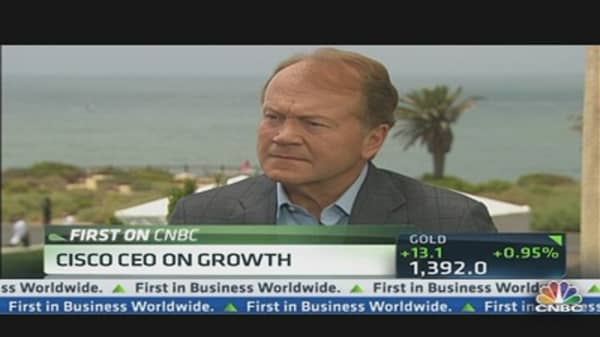Cisco Systems doesn't want to completely nullify Microsoft's deal with Skype, but it does want some changes to the deal, Cisco's chairman and CEO, John Chambers, said Wednesday on CNBC's Closing Bell.
"All we want is interoperability, that's what Microsoft and others have asked of us when we've had acquisitions and we think there needs to be easy interoperability ... the capability of any device to [connect to] any content that we think allows the Internet to grow," Chambers said.
Cisco, the world's biggest maker of network equipment, asked the EU on Wednesday to annul the approval of Microsoft's Skype deal. Basically, Cisco claims that Microsoft has an unfair advantage because it makes up so much of the Internet-based voice and video communication service market, a sector that Cisco has been trying to expand its presence.
(Read More: Cisco: Microsoft's Deal With Skype Is Monopolistic)
Skype accounts for about one-third of the voice calls made globally and boasts 280 million people using the service for more than 100 minutes each month, said Kevin Turner, Microsoft's chief operating officer, earlier this year.
"We don't really compete with a specific competitor, we compete on market transitions, so our ability to win in the cloud—where we literally grew 70 percent in the last quarter—where we win in wireless and where we win in video, has been balancing a communications business that has been flat the last quarter or two," Chambers said.
Judges in the EU are expected to rule on Cisco's case against Microsoft in the coming months.
However, while Cisco's communications business may be flat, its shown great growth in other areas, like mobile, Chambers said.
"Mobile was probably our Achilles' heel 2½ years ago, it's now our strength. We are the No.1 player in almost every aspect of the mobile market, whether it's service provider or Wi-Fi capability," he said.
Chambers also said he sees huge potential for Cisco as more devices, like wearable computers, become connected to the Internet.
"We want to do things to where new growth is going to occur, whether it's Apple, Google or other players, the more networks, the more storage required, the more moving information around, the new generation of technology is kind of mobile in the cloud, analytics and big data, that sets us up for the next Internet, something called the Internet of Everything," he said.
_ By CNBC's Cadie Thompson. Follow her on Twitter @CadieThompson.




